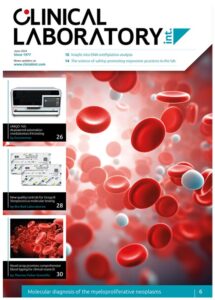New automation technologies at the vanguard of IFA diagnostics
EUROIMMUN has been creating innovative solutions for immunofluorescence diagnostics for over thirty years. Continuing this long tradition, the company has over the last year introduced further groundbreaking products to increase the efficiency and standardization of indirect immunofluorescence assay (IFA) analyses. CLI talked to Dr Panagiotis Grypiotis, Head of Product Management Autoimmune Diagnostics, Endocrinology/Biologics and Automation & Software at EUROIMMUN to learn how the new technologies can transform IFA analyses in the laboratory.
Why are indirect immunofluorescence assays (IFAs) so central for diagnostics?
IFAs count among the fundamental screening methods for the detection of anti-bodies, for example in autoimmune or infectious diseases. Owing to the growing life expectancy and burgeoning population of chronically ill individuals, the global demand for IFA diagnostics is continually increasing.
What are the challenges for laboratories?
Although demand for IFAs is increasing, there is a general lack of skilled staff to perform and evaluate the analyses. Some laboratories are merging to overcome this bottleneck. To manage high sample volumes, labs also require high-performance automation systems to minimize the manual workload and deliver highly standardized results.
How do EUROIMMUN technologies support IFA diagnostics?
EUROIMMUN’s broad technology base and decades of experience in IFAs means we are ideally positioned to respond to laboratories’ evolving requirements. Examples of our pioneering developments for immunofluorescence diagnostics include BIOCHIP mosaics for efficient multiplex analyses, TITERPLANE technique for incubation of slides under standardized conditions, and MERGITE! technology for gentle and meticulous slide washing. The in-house EUROLab-Workstation IFA integrates these and other technologies to provide fully automated slide processing at an unmatched throughput of 200 samples per hour. Our revolutionary microscopes from the EUROPattern series provide computer-aided immunofluorescence microscopy, combining high-speed image acquisition with pattern evaluation based on artificial intelligence via the EUROLabOffice 4.0 software. We are particularly proud of the EUROPattern Microscope Live, introduced last year, which enables live microscopy and has an unparalleled image acquisition speed of just two seconds per image!
What’s new in 2022?
We have two very exciting launches this year for immunofluorescence diagnostics. The UNIQO 160, which will be available later this year, is our first system that truly fully automates the processing plus evaluation of IFA. In this respect, it represents the next generation of IFA automation. A further 2022 milestone is our EUROLab-Polaris software, which connects laboratory sites digitally, enabling centralised evaluation of IFA results.
Tell us more about UNIQO 160
The UNIQO 160 system is designed for complete walkaway automation of EUROIMMUN indirect immunofluorescence tests from primary sample to software-generated result proposal. As well as performing the incubation and washing, it coverslips the slides, acquires the images and provides these to the EUROLabOffice 4.0 software for automated evaluation. Thus, after device loading, no more manual steps are required until the result verification. The instrument has a capacity of 160 samples per run and is therefore ideal for laboratories with medium sample throughput that are looking for a high degree of automation.
What are its special features?
UNIQO 160 incorporates barcode scanners which identify samples, reagents and slides during the entire process, ensuring quick loading, correct assignment and complete traceability of all items. It also possesses a three-needle system for efficient pipetting of samples, reagents and mounting medium and for washing. The automatic coverslipping is a unique feature of this system and ensures that the slides do not dry out. For image acquisition, the instrument boasts an integrated high-quality microscope unit with an autofocus and three automatically changing objectives (4×, 10×, 20×), ensuring the acquisition of brilliant fluorescence images.
How are the images evaluated?
The acquired images are evaluated in the EUROLabOffice 4.0 software with the aid of the EUROPattern Classifier, which uses deep convolutional neural networks to provide reliable discrimi-nation of positive and negative results, pattern recognition and titer determination. The AI-based evaluation encompasses applications such as anti-nuclear antibodies on HEp-2 cells, antineutrophil granulocyte antibodies on granulocyte substrates, anti-dsDNA antibodies on Crithidia luciliae, anti-neural antibodies on recombinant-cell substrates, and autoantibodies on tissue substrates such as liver and kidney. The software generates a result proposal, which can be confirmed by the laboratory physician with just one mouse click or corrected directly in the software if necessary.
What benefits does EUROLabPolaris offer to labs?
EUROLabPolaris supports laboratories that can process IFAs, but cannot diagnostically evaluate and verify the results, for example owing to a lack of staff with experience in immunofluorescence diagnostics.
With the multisite platform, images acquired using a EUROPattern series microscope are transferred to a partner site at a different location for evaluation. A specialist at this site appraises the results, enters them in the software, verifies them and then sends the result back. So a single IFA specialist is able to provide their expertise digitally to multiple laboratories without having to be onsite or travel between locations. As samples no longer have to be transported between sites, turnaround time is reduced and logistics are simplified, yielding cost savings for the laboratory. The data are securely coded and 100% traceable during the entire transfer process, ensuring highest data integrity. To help the IFA specialists plan their workflow, the system provides a comprehensive overview of open requests, including due dates, request numbers and urgent-sample identifiers.
The centralized evaluation of IFA can help to compensate for the lack of IFA specialists, which is predicted to intensify in the future owing to many experienced clinicians entering retirement. The central evaluation by a small pool of experts, who are able to discuss results with each other and share their experience, also ensures a high level of consistency and standardization in the otherwise quite subjective interpretation of immunofluorescence patterns. The data exchange can be implemented nationally or internationally (subject of course to local regulatory requirements), thus ushering in an era of truly global and intelligently connected IFA diagnostics.
EUROIMMUN AG
Seekamp 31, 23560 Luebeck, Germany
Tel +49 451 2032-0, info@euroimmun.de, www.euroimmun.com




